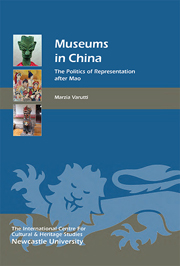Book contents
- Frontmatter
- Contents
- List of Illustrations
- Acknowledgments
- Chronology
- List of Abbreviations
- Introduction
- 1 Cultural Heritage in China
- 2 Museums in China: origins and Development
- 3 New Actors in the Chinese Museum World
- 4 Museum objects and the Chinese nation
- 5 The nation in the Museum
- 6 The Politics of the Past
- 7 The Representation of the Past in China's Museums
- 8 The Politics of identity
- 9 The Museum Representation of ethnic Minorities
- 10 Techniques and sites of Display of ethnic Minorities
- Conclusions: The new Museums of China
- Appendix: List of Museums in China Visited by the Author
- Bibliography and References
- Index
- Heritage Matters
9 - The Museum Representation of ethnic Minorities
Published online by Cambridge University Press: 05 March 2014
- Frontmatter
- Contents
- List of Illustrations
- Acknowledgments
- Chronology
- List of Abbreviations
- Introduction
- 1 Cultural Heritage in China
- 2 Museums in China: origins and Development
- 3 New Actors in the Chinese Museum World
- 4 Museum objects and the Chinese nation
- 5 The nation in the Museum
- 6 The Politics of the Past
- 7 The Representation of the Past in China's Museums
- 8 The Politics of identity
- 9 The Museum Representation of ethnic Minorities
- 10 Techniques and sites of Display of ethnic Minorities
- Conclusions: The new Museums of China
- Appendix: List of Museums in China Visited by the Author
- Bibliography and References
- Index
- Heritage Matters
Summary
This chapter considers the relevance of ethnic minorities in discourses on Chinese national identity and explores the representation of Chinese ethnic groups in museums. The Chinese expression used to designate ethnic groups is shaoshu minzu, which literally means ‘minority nationality’ or ‘national minority’. The term shao is a diminutive; it may refer to a small number and/or small size. Minzu also appears in the official denomination of China as a ‘unified, multinational state’, duominzu guojia, literally a ‘country with many nationalities’. The term minzu is laden with political significance. As the historian of China Frank Dikötter (1996, 594) notes, ‘The conflation of “race”, descent and nation has been expressed throughout the twentieth century by the term minzu, signifying both a descent group and a cultural community.’ Moreover, it should not be overlooked that the term ‘ethnic minority’ (minzu) defines a group by means of its relative, subaltern position to another group. Bearing these terminological nuances in mind, the expressions ‘ethnic minorities’, ‘ethnic groups’ and ‘nationalities’ are here used interchangeably for the sake of simplicity and to conform with their use in museum texts in China.
The Official Discourse About Ethnic Minorities
Ethnic groups occupy a central position in the representation of the Chinese nation. The opening ceremony of the 2008 Beijing Olympic Games, with its emphasis on the performances of the various ethnic groups, provided a powerful illustration of China's ‘unity within diversity’.
- Type
- Chapter
- Information
- Museums in ChinaThe Politics of Representation after Mao, pp. 129 - 144Publisher: Boydell & BrewerPrint publication year: 2014

